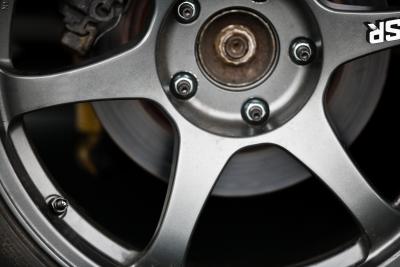
Forging and casting are two different processes used to manufacture the metal wheels used on vehicles. Forging employs extreme pressure to shape the metal, while casting uses molten metal and a mold to form the wheel. Whether to forge or cast a wheel depends on factors that include intended usage and cost.
Forged wheels start out as an ingot – a large mass of metal, usually aluminum or aluminum alloy. These ingots are then reduced to smaller billets before hammers or presses forge them into shape. Each billet requires repetitive machining to reach its required configuration before finishing operations begin. Casting a wheel, on the other hand, is a simpler and less-expensive process. A mold is prepared and molten metal is poured into it. The metal is then heat treated to facilitate solidification. Finishing touches are applied at a later stage.
Forged wheels tend to be lighter and stronger than their cast counterparts. The extreme pressure of forging results in a dense material free of pores and voids. While the cast metal's strength is distributed in all directions, the strength of a forged wheel is concentrated in its longitudinal axis, providing a sturdy core. As both types of wheels are usually made of some form of aluminum, both are quite corrosion resistant.
As a rule of thumb, lighter wheels are preferred by users interested in high performance and the best quality. Forged wheels are generally lighter than forged wheels and are stronger due to their relative density.
Forged wheels are more expensive to produce than cast wheels. The forging process requires advanced technology and machinery to create the required amount of pressure. Metal casting is simpler and requires less metal. Casting is preferred for mass production as it is cheaper and yields more product in a shorter amount of time. Casting also requires less and simpler maintenance on machinery.
Cast wheels have an advantage only in terms of cost. The manufacturing process is cheaper and changes to designs are relatively quick and easy. Cast wheels are strong enough to be acceptable to most manufacturers and, because of their cost advantage, are fitted at the factory as original equipment on most cars. Forged wheels, on the other hand, are lighter, stronger and more expensive then their cast counterparts. Because of this, makers of ultra-high-performance vehicles usually choose forged wheels as original equipment.